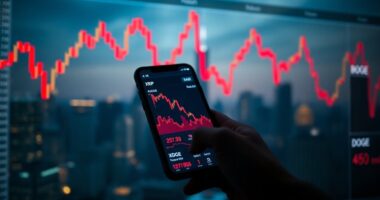You might not realize how AI-generated content can stir panic among consumers. Recent findings from the UK suggest that misinformation spread through these channels could trigger bank runs. As trust in financial institutions wavers, the risk grows. With banks more interconnected than ever, the implications for systemic stability are concerning. What measures can regulators take to address these emerging threats? The answers may surprise you.

As financial institutions increasingly adopt AI-generated material, the potential for both innovation and risk grows. You might find this especially relevant, considering how generative AI can create new content that could manipulate financial information. This manipulation isn't just a thought experiment; it poses real risks to the stability of the financial system. Increased interconnectedness among institutions can lead to systemic risks, where one failure may trigger a cascade of problems across the network.
Moreover, the lack of explainability in AI models complicates oversight. If you can't understand how a model arrives at a decision, it becomes nearly impossible to hold anyone accountable when things go awry. This opacity is a significant concern for regulators who are already struggling to keep pace with the rapid evolution of AI technologies. The regulatory landscape is complex, and the potential for misuse—like sophisticated phishing attacks or deepfakes—adds another layer of urgency. Such cyber threats can destabilize the trust that's essential for the smooth functioning of financial systems. Additionally, the integration of AI for predictive analysis may inadvertently lead to the amplification of misinformation within the financial sector.
When you consider AI's impact on banking operations, you see a double-edged sword. On one side, AI enhances operational efficiency by automating routine tasks and improving customer service. However, if not properly managed, these same efficiencies can lead to significant risks, especially in automated decision-making. With over half of AI use cases revolving around this, governance becomes a major challenge. If AI trading models amplify market volatility, you might witness a scenario where correlated trading behaviors create unpredictable market swings. Regulatory frameworks need to adapt in light of the PRA and FCA's focus on consumer outcomes.
Regulatory approaches to managing these risks are evolving. In the UK, regulators favor technology-neutral frameworks that focus on outcomes rather than prescribing specific technologies. This adaptability is crucial, given the rapid changes in AI capabilities. The establishment of an AI Consortium by the Bank of England aims to identify risks while promoting best practices. You'll also see that funding is being allocated for AI governance to enhance regulatory capacity.
Looking ahead, stress testing frameworks may need to adapt to evaluate the interactions of AI models and assess potential systemic risks. As financial institutions integrate AI, developing AI literacy becomes vital for effective implementation. When you think about the future, it's clear that managing AI-generated material is crucial—not just for innovation, but for safeguarding the financial stability that underpins the entire system.









